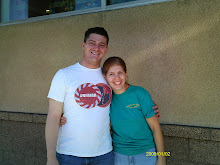
The woman's voice through the loud speakers suddenly registered in my ears, her words a crisp, clear English that carried over the drum of the thousands come to pay their respects that day. "The washing ceremony of the Baby Buddha is going on right now," she announced. "It cleanses us from our anger, bitterness, and harmful thoughts." She then listed other activities around the sacred site which the foreigner could pleasantly engage in, such as writing prayers to hang from paper lanterns.
I glanced to my right at the long row of fold-out tables resting along one side of the broad, walled-in footpath that led to the inner courts of the temple. There, the colorful, flat lamps sat collected in piles, waiting for prayers and wishes to fill them. I noted the profusion of plainly clothed, smiling workers stationed behind the mounds. "Volunteers are here to help you along the front gate," the announcer reminded us. "We are here today to celebrate and honor the work of the Buddha in the world. We hope you have a meaningful day."
Warily, I crept closer to the inner sanctum, resistant to the idea of having visited a Buddhist temple on the Buddha's birthday. Walking through the entrance, I passed tables of men selling tiny piggy-bank-like plastic figures and piles of bags of rice and other sustenance, offerings for the statues which would undoubtedly be found inside. I followed the footsteps of my adventuresome acquaintance, one of the four in our group, which led me up the steps and into Buddha's wide, covered courtyard.
Idolatry dripped like the rain droplets which fell from each lantern strung low over our heads. Wishing lanterns, these were: each a perfect red sphere with four or five bright green leaves and a swaying white paper attached to its bottom. Unlike the hexagonal prayer lamps which hung in the outer courts, these were the same color because they were the same price. The multi-colored ones were different prices, I was told.
You have to pay to leave prayers for your god? I thought. I wondered where the proceeds from the sale of such communication went.
Underneath the damp canopy stood a trio of lines a few yards away, the view of which was cluttered by ladders and other superfluous equipment in front of them. The middle line protruded directly in front of me and led to an attendant helping temple-goers with lighted candles. The outer two queues were for parishioners waiting for the cleansing ceremony: At the front of them stood two foot-tall gold statuettes of baby Buddha, which participants poured water on from something that looked like a tin camping mug.
Why is it that your god needs washing? I wondered again. And how is it that this is all that is needed to take away the blood-red stain of sin?
"It's the same reason Catholics kiss the feet of Jesus," I heard my companion say. What I failed to tell her is that I wasn't Catholic. Nor was my God still wounded on a Cross.
"I assume you don't want to stand in line," she continued, sensing our group's collective hesitancy to participate in the idol worship. "We can walk around the temple to the other statues," she suggested. Together, the four of us nervously passed by the lines of the faithful and out toward the soggy grounds.
As we walked, I noted with sadness the short scaffolding set up to receive the myriad prayer lanterns, its tight string filled to brimming with the colorful, swaying shapes. As we continued walking, still more scaffolding presented itself--this time waiting to be filled. Who will read them? I thought. Will the Buddha breathe life into one of his statues and come down? Will he then read all these prayers?
We passed another statue toward the temple's exit, and at the sight of this my acquaintance stood ecstatic. "Guanyin! That's the other one who's here!" she exclaimed. When asked who it was, she mentioned that this was the "Buddhist statue of mercy," and jubilantly walked across the bridge to where it sat.
On an island in the middle of a small pond, the statue rose high above its disciples, bags of rice, stacks of apples, and other edible offerings at its feet. My heart sank as I watched the scene, knowing with growing lament that humans would collect those gifts after the faithful disappeared. Why worship a god who is not even able to receive your worship to him? I questioned. Why worship something which cannot see, hear, feel, speak, or help?
As I sit reflecting on the scene from yesterday, I'm reminded of the sovereignty and power of my God. He does not sleep nor does He slumber, and every prayer and offering I give Him He both hears and receives. I do not wash Him, but He reaches down and washes me. "Consecrate yourselves therefore, and be holy," reads Leviticus 20, "--for I AM the LORD your God... I am the LORD who sanctifies you" (7-8).

No comments:
Post a Comment